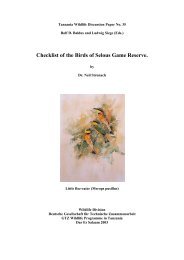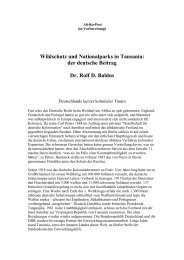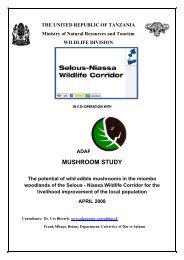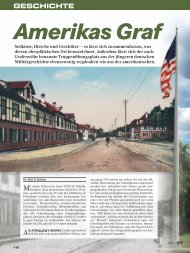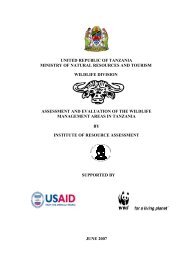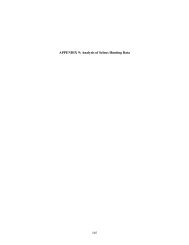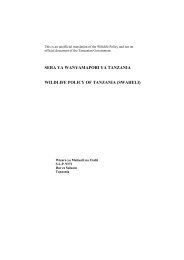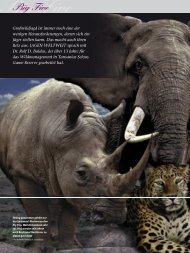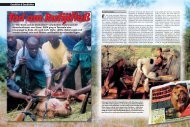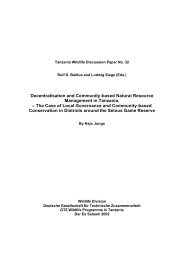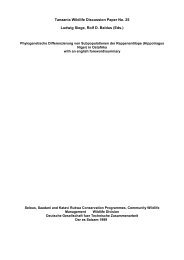African Indaba Articles - wildlife-baldus.com
African Indaba Articles - wildlife-baldus.com
African Indaba Articles - wildlife-baldus.com
Create successful ePaper yourself
Turn your PDF publications into a flip-book with our unique Google optimized e-Paper software.
conservation arena, I have undertaken to learn about sport hunting as much as I could. I have ac<strong>com</strong>paniedhunters, I studied the hunting arrangements in several countries and I familiarized myself with the thinking ofhunter and anti-hunter. Anti-hunters believe that individualized, platonic ethics apply to animals as well as tohumans and hence the killing of animals is unethical. The anti-hunting front is not monolithic, however, andnot all anti-hunters are vegetarians, yet their thinking, at least with regard to <strong>wildlife</strong> is stronglyanthropomorphic. In contradistinction to platonic ethics, utilitarian ethics seeks the maximum benefit for themaximum number, be it people, or, indeed as in this case, species.”And Dr Loefler concluded his reply with these remarks: “Sport hunting, properly organized and regulatedand free of corruption can create wealth in rural areas but in order to do so, a number of conditions need tobe met and they are not easy to meet. In utilitarian terms sport hunting can benefit people and <strong>wildlife</strong> but notjust everywhere. The debate on sport hunting should not be allowed to derail the <strong>wildlife</strong> policy review.Discrediting the rational discussion about the wise use of <strong>wildlife</strong> and discrediting the proponents of <strong>wildlife</strong>husbandry is a tactic animal welfarist and animal rightists often apply, one fine example being Isiche's essay.Yes, there is a paradox in the notion that the saving of species may depend on the killing of individuals. Aparadox, by definition, is an apparent contradiction, not a true one. Those who may have difficulty in<strong>com</strong>prehending the paradox may consider the status of the humble goat. Goats are everywhere. They arebred, attended to, traded and cherished because they have a value. If goats were declared <strong>wildlife</strong>, under thepresent policy they could not be owned, killed, eaten and their skin would be worthless too. The bush meattrade would quickly decimate goats and within a few years we would have to establish goat sanctuaries tosave the species.”Mbaria deplores that many <strong>African</strong> countries, Kenya included, do not have the capacity to adequatelymonitor the activities of extractive use. Short<strong>com</strong>ings in this respect need and are being addressed. But, MrMbaria, do the Kenyans have the capacity exercise control over IFAW? I suggest that IFAW’s destructiveactions at the time of the GG Kariuki Bill find continuation now: IFAW funds legions of so-called stakeholders– mostly urban, many non-Kenyan – and skillfully manipulates Kenyan and global media to block any rationalnew Kenya <strong>wildlife</strong> policyMove aside IFAW – move ahead Kenya. Today’s rational conservationists look at a triple-bottomlineof social, economic and ecologic results. Kenya and its <strong>wildlife</strong> deserve a fresh start!Hunting in National Parks in the USA(Gerhard R Damm’s synopsis of the article “A National Conundrum” by Frank Miniter, published inAmerican Hunter, June 2006)Editor’s Note: <strong>African</strong> <strong>Indaba</strong> received the following information from an article published by AssociatedPress on February 9 th , 2007. It is important in relation with the synopsis of Frank Miniter’s article:“An overabundant and rapidly increasing population of 3000 elk at Rocky Mountain NationalPark near the town of Estes Park in Colorado is destroying their own habitat and foodresources and prompted the state <strong>wildlife</strong> <strong>com</strong>missioner to urge permitting controlled huntingof the animals as alternative to culling them by professional sharp shooters. The later is awaste of a valuable resource said the <strong>com</strong>missioner at the State Wildlife Commission Meetingon February 8 th 2007.It costs millions of dollars for the taxpayer, versus strictly regulated hunting which would leavea considerable surplus.The readers of <strong>African</strong> <strong>Indaba</strong> will remember the discussions and contributions to the topic “Hunting inNational Parks” in Volume 3, issues number 4 and 5, as well as Volume 4, issues number 2 and 3. You areurged to revisit these contributions by going to these two links on the <strong>African</strong> <strong>Indaba</strong> Webpage:http://www.africanindaba.co.za/archive05.htm http://www.africanindaba.co.za/archive06.htm117



